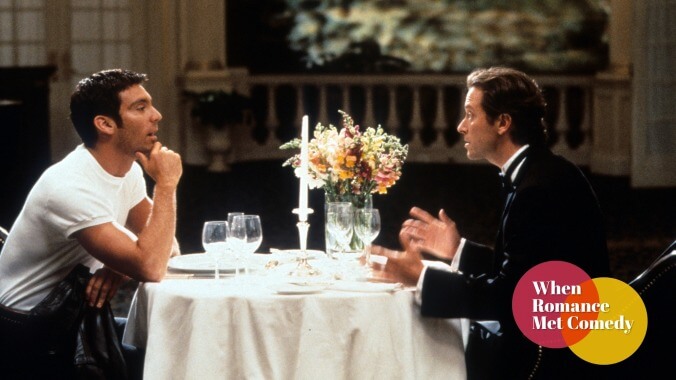Queer resilience thrives in this rom-com about love in the time of the AIDS crisis
Image: Photo: Orion/Getty Images
1995 marked a turning point in the AIDS epidemic in the United States. It was the year the FDA approved an antiretroviral treatment that would soon bring about a massive decline in AIDS-related deaths and illnesses. Yet 1995 was also the year in which AIDS-related deaths—then the leading cause of death among all Americans ages 25 to 44—reached their peak. Roughly 50,000 Americans died of AIDS complications in 1995. It was against that backdrop that the gay romantic comedy Jeffrey debuted. The experimental indie comedy is a cinematic tribute to the heart, humor, sadness, romance, and, most importantly, resilience of gay men living in New York City on the heels of a decade and a half of crisis. As one character sums it up towards the end of the film: “Just think of AIDS as the guest that won’t leave. The one we all hate. But you have to remember: Hey! It’s still our party.”
Those words are delivered to Jeffrey (Steven Weber), an aspiring actor and cater waiter who serves as the movie’s protagonist—a sort of tentative Hamlet for the mid ’90s. Frustrated by the paranoia around sex and the logistics of doing it safely (the film’s comedic opening montage sees him handing over three separate blood tests to a potential hookup), Jeffrey decides to simply swear off sex entirely. Naturally, that’s exactly when he meets Steve (Michael T. Weiss), a hunky bartender who’s instantly smitten with him. Jeffrey’s biting interior designer friend Sterling (Patrick Stewart) suggests this could be the perfect solution to Jeffrey’s sexual woes. If he starts a monogamous relationship with Steve, they can set the rules once and stop worrying. It’s worked for Sterling, who is happily coupled up with a ditzy Cats chorus boy named Darius (Bryan Batt). But just as Jeffrey comes to terms with the idea of dating, the other shoe drops: Steve is HIV positive.
Jeffrey insists that Steve’s HIV status doesn’t matter to him, yet comes up with a last-minute excuse to cancel their first date. He’s afraid of getting sick himself, but he’s even more afraid of loving someone and watching them die. It’s a future he sees echoed in Sterling and Darius’ relationship. Darius is also HIV positive, and his health is often a seesaw. One day he’s patrolling the neighborhood as part of a campily dressed anti-gay-bashing organization called “the Pink Panthers,” the next week he’s fainting from dehydration brought on by his new medication. Despite Darius’ condition, he and Sterling approach life with confidence, zest, and a flair for bon mots. Jeffrey, however, is fixated on the fact that he lives in a world where godlike men deteriorate before his eyes and memorial services are a regular part of the social calendar.
Jeffrey first began life as a successful 1993 Off-Broadway play. While the initial pitch of a comedy about AIDS raised some eyebrows, the witty play was soon heartily embraced. New York Times theater critic Stephen Holden described Jeffrey as “just the sort of play that Oscar Wilde might have written had he lived in 1990’s Manhattan and taken aim at an epidemic that was decimating his circle of friends.” The show’s success helped launch the careers of playwright Paul Rudnick (who would later go on to write the more mainstream gay rom-com In & Out) and future Tony-winning director Christopher Ashley. They soon reteamed to adapt the material into a film, keeping all its fantastical and fourth wall breaking conventions in tact—from cameo appearances from Mother Teresa to a conversation that suddenly turns into a game show.
The film adaptation of Jeffrey was met with a more mixed response, with many noting that the material didn’t work quite as well onscreen as it did onstage. The film’s budgetary limitations often show, as does Ashley’s seeming uncertainty as to how to translate his theatrical directing skills to a cinematic setting. Yet considering just how benign and familiar the romantic comedy genre can often feel, it’s still exhilarating to watch Jeffrey swing for the fences in such a big, unique way—even if it sometimes misses the mark.
In the nearly 25 years since its debut, Jeffrey has only become more interesting as it’s crystalized into a time capsule of a specific slice of the gay community in a specific time in LGBT history. Jeffrey and Steve’s relationship provides a loose narrative throughline for the film, but Jeffrey is mostly a series of vignettes about affluent gay male culture in the 1990s. The stage play starred eight actors doubling up on parts, but the film adaptation enlists a bunch of big name actors for one-scene roles. Sigourney Weaver pops up as a self-important self-help guru. Olympia Dukakis plays a mom attending Pride with her daughter, who recently came out as trans. Nathan Lane is a closeted Catholic priest who finds God in musical theater. Debra Monk and Peter Maloney portray Jeffrey’s suburban parents in a fantasy sequence where he imagines what it would be like if he could talk to his parents about his sexual woes. (While frosting a cake, his mom cheerfully asks whether he’s ever considered joining a jerk-off club.)
 Keep scrolling for more great stories.
Keep scrolling for more great stories.
